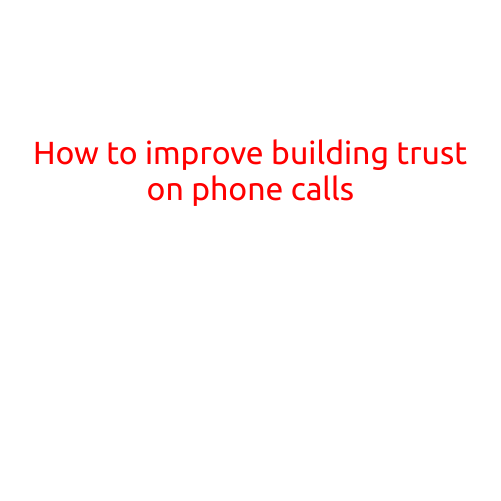
How to Improve Building Trust on Phone Calls
Building trust on phone calls is crucial for establishing strong relationships with clients, customers, or colleagues. When it comes to phone conversations, it can be challenging to convey warmth, empathy, and professionalism, especially when you’re not face-to-face. However, with some simple yet effective strategies, you can improve building trust on phone calls and increase the likelihood of successful outcomes.
1. Prepare Thoroughly
Before making the call, research the person’s background, company, and current projects. This will help you understand their context, ask informed questions, and show genuine interest in their work. Review any relevant documents or information to ensure you’re well-prepared to discuss topics relevant to the call.
2. Start Strong
Begin the call with a warm greeting and a clear introduction that includes your name, company, and a concise purpose for the call. This sets the tone for a productive and professional conversation. Use a friendly yet professional tone to establish a connection.
3. Be Authentic and Transparent
Speak naturally and honestly, avoiding jargon or overly technical language. Be open about your goals, expectations, and any limitations or challenges. Transparency fosters trust, as it shows you’re willing to be vulnerable and honest.
4. Active Listening
Pay close attention to the person’s words, tone, and body language (even though you’re not face-to-face). Verify understanding through questioning and paraphrasing to ensure you grasp their concerns and ideas accurately. This demonstrates that you value their input and are genuinely interested in their perspective.
5. Show Empathy and Understanding
Acknowledge and validate the person’s feelings, concerns, or frustrations. Share a personal experience or relevant anecdote that illustrates your understanding and compassion. Empathy goes a long way in building trust, as it shows you’re human and willing to relate to others’ experiences.
6. Be Proactive and Solution-Oriented
Rather than simply addressing the person’s concerns, proactively offer solutions, alternatives, or next steps. This demonstrates your expertise, resourcefulness, and commitment to resolving issues. Make sure to summarize the discussion and reiterate the agreed-upon course of action.
7. Follow Up and Follow Through
After the call, send a summary email or note to reiterate the conversation and any agreed-upon actions. Ensure you follow through on your commitments, providing updates and additional support as needed. This maintains trust and reinforces your reliability.
8. Use Positive Language
Use positive, constructive language to describe solutions, outcomes, and prospects. Avoid criticizing or blaming others, as this can create distrust and undermine relationships. Focus on shared goals, benefits, and opportunities for growth.
9. Be Patient and Persistent
Building trust takes time, so don’t rush the conversation or push for an instant decision. Be patient, yet persistent, and maintain a positive attitude throughout the call.
10. Practice and Refine
The more you practice building trust on phone calls, the more comfortable you’ll become with conveying warmth, empathy, and professionalism. Reflect on your experiences, insights, and feedback from others to refine your approach and continuously improve.
By incorporating these strategies into your phone conversation routine, you’ll be well on your way to establishing trust with those you interact with over the phone. Remember that building trust takes time and effort, but the benefits are well worth the investment: stronger relationships, increased credibility, and ultimately, more successful outcomes.





